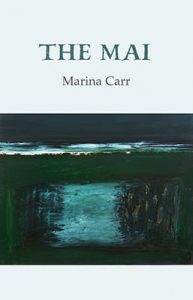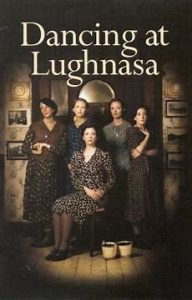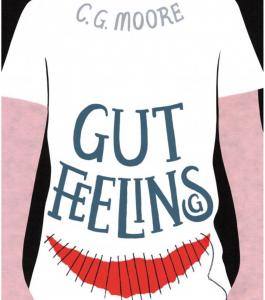In January, at the height of Lockdown we held our first online ‘Craic Across the Miles’.
Here are some of the pieces that were performed.
Poems by Eithne Cullen
Soundscape
He heard the sound of London outside his door
and saw his mother growing with the next child.
The sounds of life told with an Irish lilt,
the floor to sweep, the fire to light.
Outside was green and spacious –
inside cramped and whispered.
Dad off to work at six, his back leaving.
Brother in the pram in the hallway,
rigid in knitted armour against the cold.
A moving van with stuttering engine at the door,
the clatter of boxes and chairs and ware,
a roar across the city to a new home.
Here were the years he’d remember,
with a house, a yard and rats behind the shed,
and endless games of football in the alley,
till the house filled with children
and their chatter, their fighting and grumbling.
The school yard beckoned, chanting girls
and buzzing boys at play.
The altar server ringing the Eucharist bell;
in the sacristy where a deaf brother
kept the silence and taught the boys to finger spell.
Till music lured him to an older world,
of bands and vinyl records’ beating bass,
and guitar solos calling out their chords,
he and his friends would nod their long-haired heads
in keeping with the rocking anthems jolt.
Dad off to work at six, his back leaving.
The rhythms of his world never ceasing.
The Shrine
Plaster Our Lady with a broken nose,
hand snapped off to show a metal stump,
unseen indoors behind a huge pot plant.
She’s been blessed, bedecked
with holy hopes and plenary indulgences.
We can’t throw her away.
The garden wall is taking shape,
I mix the muck while Dad lays bricks
between the strings we’ve stretched to mark its course;
on hard core made of broken stones and crocks.
It’s hot, it all dries quickly, in the sun,
we start to think the job is almost done.
One last course to lay, I shovel and Dad looks
for a little more rubble to complete the job,
I haul more sand and water for the mix,
and Dad has disappeared into the house,
when he returns, he’s holding something,
giggling, in that shoulder shaking way I love.
The Virgin appears in this back-garden Fatima,
and I’m the awestruck child as I look on,
she’s tucked into a space he’s left for her,
she stands, chipped and smiling,
miraculously, reaching out her hands.
“Don’t tell your mother,” he conspires,
“And if anyone asks, she’s gone into a shrine.”
Return to Camden by Terence Flaherty
Download the lyrics here RETURN TO CAMDEN
The Well of Saints by John Millington Synge performed by Michael O’Sullivan
Martin Doul: The devil mend Mary Doul for putting lies on me, and letting on she was grand. The devil mend the old Saint for letting me see it was lies. The devil mend Timmy the smith for killing me with hard work, and keeping me with an empty, windy stomach in me, in the day and in the night. Ten thousand devils mend the soul of Molly Byrne and the bad, wicked souls is hidden in all the women of the world. [He rocks himself, with his hand over his face.] It’s lonesome I’ll be from this day, and if living people is a bad lot, yet Mary Doul, herself, and she a dirty, wrinkled-looking hag, was better maybe to be sitting along with than no one at all. I’ll be getting my death now, I’m thinking, sitting alone in the cold air, hearing the night coming, and the blackbirds flying round in the briars crying to themselves, the time you’ll hear one cart getting off a long way in the east, and another cart getting off a long way in the west, and a dog barking maybe, and a little wind turning the sticks. [He listens and sighs heavily.] I’ll be destroyed sitting alone and losing my senses this time the way I’m after losing my sight, for it’d make any person afeard to be sitting up hearing the sound of his breath– [He moves his feet on the stones.] –and the noise of his feet, when it’s a power of queer things do be stirring, little sticks breaking, and the grass moving till you’d take your dying oath on sun and moon a thing was breathing on the stones. [He listens for a moment, then starts up nervously, and gropes about for his stick.] I’ll be going now, I’m thinking, but I’m not sure what place my stick’s in … [He cries out.] There’s a thing with a cold, living face on it sitting up at my side. [He turns to run away, but misses his path and stumbles against the wall.] My road is lost on me now! Oh, merciful God, set my foot on the path this day, and I’ll be saying prayers morning and night, and not straining my ear after young girls, or doing any bad thing till I die–
The Tinkers Wedding by John Millington Synge performed by Nora Connolly
MARY:[A priest is tied in a sack, wriggling and struggling about on the ground. The others bundle things together in a wild haste while old Mary tries to keep him quiet.] Be quiet, your reverence. What is it ails you, with your wrigglings now? Is it choking maybe? [She puts her hand under the sack, and feels his mouth, patting him on the back.] It’s only letting on you are, holy father, for your nose is blowing back and forward as easy as an east wind on an April day. [In a soothing voice.] There now, holy father, let you stay easy, I’m telling you, and learn a little sense and patience, the way you’ll not be so airy again going to rob poor sinners of their scraps of gold. [He gets quieter.] That’s a good boy you are now, your reverence, and let you not be uneasy, for we wouldn’t hurt you at all. It’s sick and sorry we are to tease you; but what did you want meddling with the like of us, when it’s a long time we are going our own ways–father and son, and his son after him, or mother and daughter, and her own daughter again–and its little need we ever had of going up into a church and swearing–I’m told there’s swearing with it–a word no man would believe, or with drawing rings on our fingers, would be cutting our skins maybe when we’d be taking the ass from the shafts, and pulling the straps the time they’d be slippy with going around beneath the heavens in rains falling. [To the others.] Maybe he’d swear a mighty oath he wouldn’t harm us, and then we’d safer loose him; for if we went to drown him, they’d maybe hang the batch of us, man and child and woman, and the ass itself. [To the priest.] Would you swear an oath, holy father, to leave us in our freedom, and not talk at all? [Priest nods in sacking.] Didn’t I tell you? Look at the poor fellow nodding his head off in the bias of the sacks. Strip them off from him, and he’ll be easy now.
Poems from ‘Gut Feeling’ Written by and performed by Chris Moore
Craic-Excerpt-Christopher-Moore
Bí Thusa Mo Thúile. sung in Irish by Crystal Baigent.
This is a popular and well loved hymn- that is translated into English usually translated into English as ‘Be Thou My Vision’.
Click here to view the version which Crystal sang in Irish and English.
Bean Sléibhe ag Caoineadh a Mac’ – by Patrick Pearse. Performed in Irish by Mairead Ni Fhinn.
You can read the meaning of the poem below:
An old woman of the hills mourns the death of her young son
Death brings such sadness. It has taken away my son and left me desolate with neither friend
nor companion to help me bear this heavy burden.
I was just having a walk in the hills one afternoon when the birds called sorrowfully to me. Their message was that my darling boy was dead.
I called out to you, twice, but there was no reply. I kissed you and, my God, how cold your lips were.
The lonely graveyard is a harsh place to sleep.
My blessings on you and a thousand blessings on the green turf that covers you as you lie in your small narrow bed.
But death, when it comes, cannot be rejected. It lays its icy hand on young and old alike.
And I also feel crucified as I look at my gentle little son’s body lying here making clay.
Lie back in your green grave now my child. This will be a long sleep. You’ve left me, forever.
I will cry silently alone until it’s my turn to join you.
Wallis Hamilton Felton performed a short piece from the Mai by Marina Carr.
 Set in the Irish midlands whose landscape becomes the arena in which Marina Carr’s Gothic epics expand, The Mai revolves around Millie’s harrowing narrative of the desperate loves of her mother, a woman faithful to a man incapable of loyalty.
Set in the Irish midlands whose landscape becomes the arena in which Marina Carr’s Gothic epics expand, The Mai revolves around Millie’s harrowing narrative of the desperate loves of her mother, a woman faithful to a man incapable of loyalty.
and sung the beautiful song : She Moved Through the Fair
My young love said to me,
“My mother won’t mind,
And my father won’t slight you
For your lack of kine.”
And she stepped away from me
And this she did say,
“It will not be long, love,
Till our wedding day.”
 Jackie Pulford performed a piece from Dancing at Lughnasa by Brian Friel.
Jackie Pulford performed a piece from Dancing at Lughnasa by Brian Friel.
Dancing at Lughnasa is a 1990 play by dramatist Brian Friel set in County Donegal in Ulster in the north of Ireland in August 1936 in the fictional town of Ballybeg. It is a memory play told from the point of view of the adult Michael Evans, the narrator. He recounts the summer in his aunts’ cottage when he was seven years old.
Nora Connolly Performed ‘Up to Me Oxters’- poet unknown.
I was up to me oxters in peat mould
Patriotically digging the bog
When me slain struck against something hard Sir
‘Twas a stone or a lump of a log.
‘Twas a chest of finest box oak Sir
Neatly bound up with strips of elk hide.
So I just – Oh B****r the fairies
I’ll just take a wee look inside.
Preserved in the bog through the ages
And addressed to the High King Abu
‘Twas an ancient old Irish French letter
A relic of Brian Boru.
‘Twas made of the finest elk hide sir
And stood nigh on nine inches tall.
With a little brass knob on the end sire
And his name and the stud fee and all.
So I cast me mind back through the ages
And pictured that hairly old Celt
King Brian Boru on his bead Sir
Queen Grannuaile in her pelt.
Now the King of Dalcatia was angry.
And outlined his terrible plight.
Your have your own way long enough dear.
Tis the hairy out love tonight.
The Four Farellys by Percy French was performed by Gerry Molumby.
In a small hotel in London I was sitting down to dine,
When the waiter brought the register and asked me if I’d sign.
And as I signed I ‘saw a name that set my heart astir –
A certain “Francis Farrelly” had signed the register.
I knew a lot of Farrellys and out of all the crew
I kept on “sort of wonderin’ “which Farrelly were you.
And when I’d finished dinner I sat back in my chair,
Going round my native land to find, what Farrelly you were.
SOUTH
Were you the keen-eyed Kerryman I met below Kenmare,
Who told me that when Ireland fought “the odds were never fair.”
If Cromwell had met Sarsfield, or met Owen Roe O’Neill,
It’s not to Minister Gladstone we’d be lookin’ for repeal.
Would have Ireland for the Irish, not a Saxon to be seen,
And only Gaelic spoken in that House on College Green.
Told me landlords wor the Divil! Their agints ten times worse,
And iv’ry sort of government for Ireland was a curse!
Oh! if you’re that Francis Farrelly, your dreams have not come true,
Still, Slainthe! Slainthe! Fransheen! For I like a man like you!
NORTH
Or were you Francis Farrelly that often used to say
He’d like to blow them Papishes from Darry walls away?
The boy that used to bother me that Orange Lodge to join,
And thought that history started with the Battle o’ the Boyne. –
I was not all with ye, Francis, the Pope is not ma friend,
But still I hope, poor man, he’ll die without that bloody end. –
And when yer quit from care yerself, and get to Kingdom Come,
It’s no use teachin’ you the harp – you’ll play the Orange drum!
Och! Man, ye wor a fighter, of that I had no doubt,
For I seen ya in Belfast one night when Antrim road was out!
And many a time that evinin’ I thought ye wor dead,
The way them Papish pavin’ stones was hoppin’ off yer head.
Oh! if you’re the Francis Farrelly who came from North Tyrone –
Here’s lookin’ to ye Francis, but do leave the Pope alone!
EAST
Or were you the Francis Farrelly that in my college days
For strolling on the Kingstown Pier had such a curious craze?
D’ye mind them lovely sisters – the blonde and the brunette?
I know I’ve not forgotten, and I don’t think you forget!
That picnic at the Dargle – and the other at the Scalp –
How my heart was palpitatin’ – hers wasn’t – not a palp!
Someone said ye married money – and maybe ye were wise,
But the gold you loved was in her hair, and the di’monds in her eyes!
So I’d like to think ye married her and that you’re with her yet,
‘Twas some “meleesha” officer that married the brunette;
But the blonde one always loved ye, and I knew you loved her too,
So me blessin’s on ye, Francis, and the blue sky over you!
WEST
Or were you the Francis Farrelly I met so long ago,
In the bog below Belmullet, in the County of Mayo?
That long-legged, freckled Francis with the deepset, wistful eyes,
That seemed to take their colour from those ever changing skies,
That put his flute together as I sketched the distant scene,
And played me “Planxty Kelly” and the “Wakes of Inniskeen.”
That told me in the Autumn he’d be sailin’ to the West
To try and make his fortune and send money to the rest.
And would I draw a picture of the place where he was born,
And he’d hang it up, and look at it, and not feel so forlorn.
And when I had it finished, you got up from where you sat,
And you said, “Well, you’re the Divil, and I can’t say more than that.”
Oh! if you’re that Francis Farrelly, your fortune may be small,
But I’m thinking – thinking – Francis, that I love you best of all;
And I never can forget you – though its years and years ago –
In the bog below Belmullet, in the County of Mayo.
French, Percy. (1980) ‘Prose, Poems & Parodies.’ Dublin, Helicon Limited
